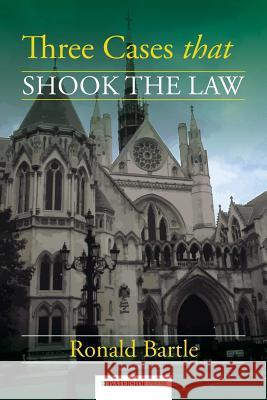Three Cases That Shook the Law » książka
Three Cases That Shook the Law
ISBN-13: 9781909976306 / Angielski / Miękka / 2016 / 244 str.
There are cases in the annals of English criminal law that forever resonate. In Three Cases that Shook the Law former district judge Ronald Bartle has selected three for close scrutiny: cases where the defendants paid the ultimate penalty even though demonstrably the victims of injustice. They are those of Edith Thompson who suffered due to her romantic mind-set, a young lover and the prevailing moral climate; William Joyce (Lord 'Haw Haw') where the law was stretched to its limits to accommodate treason; and Timothy Evans who died due to the lies of the principal prosecution witness Reginald John Halliday Christie who it later transpired was both a serial killer and likely perpetrator. Weaving narrative, transcripts and original court records the author presents the reader with a captivating book in which his long experience as a lawyer and magistrate is brought fully to bear. A valuable addition to the history of English law that will be of particular interest to those concerned about miscarriages of justice or capital punishment (which remains rife in parts of the world). A must for collectors and librarians. Contains a powerful analysis of three of English law's most iconic criminal cases. With extracts from the original transcripts and court reports. Readable, accessible and engaging. Paints vivid pictures of three different social eras. Extract: "If ever anyone on trial for murder brought about their own conviction and execution that person was Edith Thompson. Her letters were the only evidence of a guilty intent - namely the alleged incitement of Bywaters to murder her husband - and for that reason, as we shall see, the prosecuting counsel made the very most of them ... As the song goes: "Maybe that love is blind when passion rules." Passion rules with the power of a tyrant in this particular romance." Ronald Bartle was Deputy Chief Stipendiary Magistrate for Inner London. His books include The Telephone Murder: The Mysterious Death of Julia Wallace (2012); The Police Witness: A Guide to Presenting Evidence in Court (1984 onwards) and Bow Street Beak (which has a Foreword by Lord Hurd of Westwell) (2000).
There are cases in the annals of English criminal law that forever resonate. In Three Cases that Shook the Law former district judge Ronald Bartle has selected three for close scrutiny: cases where the defendants paid the ultimate penalty even though demonstrably the victims of injustice. They are those of Edith Thompson who suffered due to her romantic mind-set, a young lover and the prevailing moral climate; William Joyce (Lord Haw Haw) where the law was stretched to its limits to accommodate treason; and Timothy Evans who died due to the lies of the principal prosecution witness Reginald John Halliday Christie who it later transpired was both a serial killer and likely perpetrator. Weaving narrative, transcripts and original court records the author presents the reader with a captivating book in which his long experience as a lawyer and magistrate is brought fully to bear. A valuable addition to the history of English law that will be of particular interest to those concerned about miscarriages of justice or capital punishment (which remains rife in parts of the world).A must for collectors and librarians. Contains a powerful analysis of three of English laws most iconic criminal cases. With extracts from the original transcripts and court reports. Readable, accessible and engaging. Paints vivid pictures of three different social eras.Extract: "If ever anyone on trial for murder brought about their own conviction and execution that person was Edith Thompson. Her letters were the only evidence of a guilty intent - namely the alleged incitement of Bywaters to murder her husband - and for that reason, as we shall see, the prosecuting counsel made the very most of them ... As the song goes: "Maybe that love is blind when passion rules." Passion rules with the power of a tyrant in this particular romance."Ronald Bartle was Deputy Chief Stipendiary Magistrate for Inner London. His books include The Telephone Murder: The Mysterious Death of Julia Wallace (2012); The Police Witness: A Guide to Presenting Evidence in Court (1984 onwards) and Bow Street Beak (which has a Foreword by Lord Hurd of Westwell) (2000).











